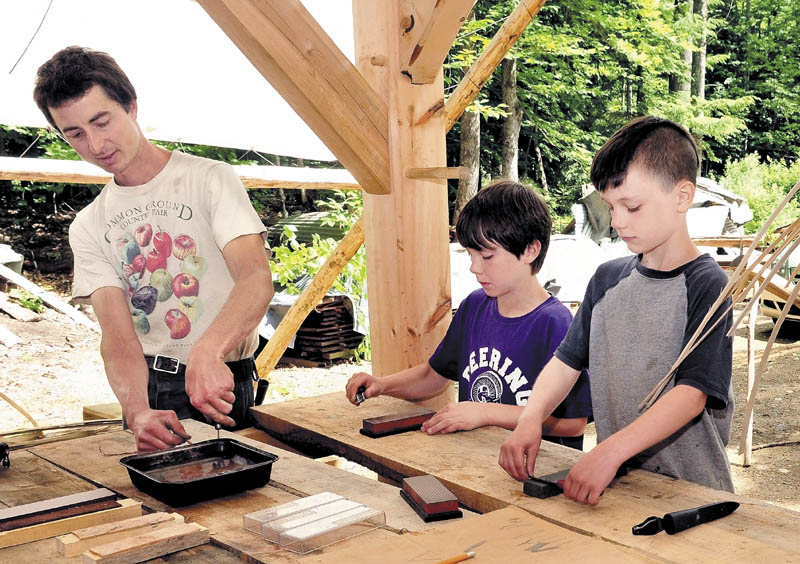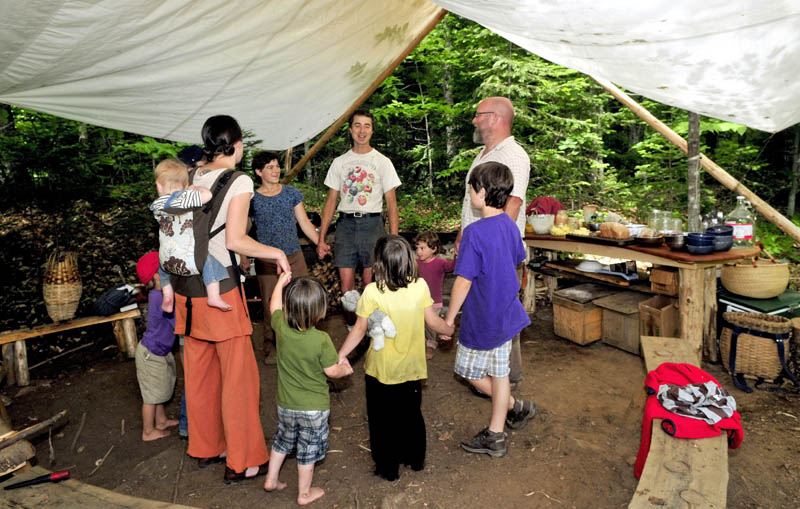TEMPLE — Local living is an old idea that’s come around again, according to Chris and Ashirah Knapp, who have begun offering a new kind of three-day vacation.
The Knapps own the Koviashuvik Local Living School, where they live, work, teach and host, all in the service of a sustainable lifestyle.
“Local living is understanding where the basics of your life come from, to the point someone wakes up and says, ‘Ah! What a gift!'” Chris said.
The school’s name, Koviashuvik, is an Inuit word meaning “the time and joy of place in the present,” according to Chris.
This year, for the first time, the Knapps have begun hosting families for three-day instructional stays, during which they learn skills such as turning deer hide into leather or acorns into flour.
“There’s a lot of joy and meaning in the work,” Ashira said.
The back-to-your-roots homestead is deep in the Temple woods. To get there, visitors first drive on pavement with bright green grass growing through the cracks. When the pavement ends, they continue on deep-rutted dirt roads heavily shaded by the forest. Finally, they cross a wooden bridge and arrive at a place where skills such as knife-sharpening and foraging for food are prized more highly than electronic gadgets or Wall Street savvy. It houses a variety of buildings and tents for a workshop, a root cellar, and living quarters for the Knapps and their visitors.
Participants in a Family Sustainability Stay spend up to $650 to live at Koviashuvik for three days. During that time, they can learn any of a hundred life skills, including how to make a stove from a coffee can, carve a spoon, use spring water for daily needs, make moccasins, grind grain, grow apples, weave baskets and make compost.
Steve and Amanda Soule and their five children finished a three-day stay at Koviashuvik on Thursday. The children, whose ages range from 1 to 13, enjoyed shooting home-made bows and arrows and splashing around in a shallow pond on the homestead as much as they enjoyed the more structured lessons.
Ezra Soule, 9, said he likes many of the activities, but one class stood out as his favorite.
“Tracking animals,” he said. “Mostly deer.”
The Soules will take the lessons that they learn at Koviashuvik to their own home, a 200-year-old farmhouse in southern Maine that they are slowly turning back into a working homestead.
“We’re at the beginning of our homesteading journey,” said Amanda. “It’s nice to have people doing the same thing, so we can learn from their mistakes.”
Amanda said that while they do their best to learn from books, nothing can replace the hands-on instruction.
“It adds more soul to the experience, rather than seeing it flat in a book,” she said.
Steve said his time at Koviashuvik also pushes him to try new experiences.
“You hear you can eat dandelions,” he said, “but until you’ve taken one out of the ground and cleaned it off, you haven’t done it.”
The Knapps say people don’t have to be full-time dandelion-eating composters to benefit from a stay.
“We’re not telling people that they should all live a sustainable life,” Ashira said. “We’re on one end of the spectrum, but there are pieces of what we do that are useful to modern life. People can learn how to sharpen their kitchen knives or take a moccasin class.”
Visitors won’t find mints under the pillows at Koviashuvik. Visiting families sleep communally on futon mattress spread across the floor of a large yurt-style tent heated with a wood stove.
While there, they get to see and experience the homestead’s composting toilet, the root cellar, the solar shower, the greenhouse and the ice house, where large slabs of ice from last winter still endure, nestled in beds of sawdust.
Mealtimes allow everyone to experience the food, all of which is grown locally.
“Yesterday, a girl here ground corn, and we made cornbread to go with our chili,” Chris said.
The Soules want their children to grow up having learned how to provide for themselves from the land, and with a deep understanding of the relationship between the food that crosses their plate and where it comes from.
Not that long ago, Steve said, those lessons would have been passed down within the family.
“This is a huge part of our past,” he said. “Our grandparents knew how to do a lot of these things, but life on a farm is hard. For a generation or two, they were happy to get away from it.”
Now, Steve and Amanda report, the skills that they are learning are stirring memories in their parents, who are eager to discuss the ins and outs of sustainable living.
“My father started tapping trees again after 40 years,” said Amanda. “He’s thinking about taking up beekeeping, too.”
Matt Hongoltz-Hetling — 861-9287
mhhetling@centralmaine.com
Send questions/comments to the editors.




Comments are no longer available on this story